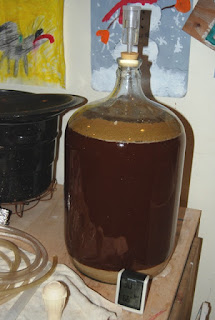There’s beer brewing in my mud room. You can hear the occasional “burp” and just in case you don’t, my husband will drag you in there to witness the bubbles escaping the tube coming from the giant glass container of murky brown liquid sitting on the work table next to the sink. This is his first batch in 12 years. That’s the same age as our daughter, whose creation halted his brewing efforts because the smell of fermenting hops made my pregnant self ill.
As the familiar scent wafted through our kitchen on Saturday, I had only a few uncomfortable moments. I had to take my lunch elsewhere. I’m happy to see him back at his craft and we’ve had more than a few chuckles reading through his notes from his brewing past. “Remember the disaster batch with the old bay?”
Coincidentally, I was also fermenting something new this week. I made sour dough starter. It was so easy I have to wonder what has kept me from the task for so long. I utilized my bread maker, but I’m not sure it’s necessary. The starter is made of water, flour, sugar and yeast. It sat on my counter for 7 days under a swath of plastic with some holes punched in it, not unlike the firefly containers of summer. Being a lazy cook, I hadn’t read the entire directions, and didn’t realize until day 5 that I was supposed to stir the concoction 2-3 times a day. Guess it isn’t critical because when I finally baked the sour dough bread on Sunday it was a HUGE HIT. Everyone loved it. No more paying $5 for a loaf at the store. I’ve got a new batch of starter going on the counter as I write this.
All this fermenting got me to thinking – what else is fermented and is it good for your health? Turns out we already eat lots of fermented stuff (pretty much every civilization depended on it for survival). I realize I ferment my yogurt each week when it sits on the counter for 24 hours in the yogurt maker at so low a temperature the stink bugs aren’t afraid to crawl over the cover (yes – they’re still here!). And the cow we buy is “dry-aged” which is a nice way of saying it hangs around in an unrefrigerated barn for 3 weeks before the butcher cuts off all the nasty fuzz that grows on it, and slices it up for us. Obviously wine is fermented, and I definitely appreciate that. Bread, coffee, and chocolate are also fermented products. What’s not to love?
Fermentation is the breakdown of carbohydrates and proteins by microorganisms such as bacteria, yeasts, and mold creating lactic acid (and alcohol in some cases). It may sound nasty, but it’s actually great for your health. Eating fermented food aids in digestion by promoting growth of friendly intestinal bacteria. It also supports immune function and introduces extra vitamins. “Live food” (or today’s buzzword, probiotics) are also believed to protect against and fight certain types of cancers. There is plenty of research that indicates our health truly benefits from fermented foods, possibly some of the increase in illnesses in the past 50 years are due to the fact that so few of us eat fermented foods anymore.
There was a time when we all ate plenty of fermented food, but these days not so much. Fermentation is more an art than a science and that doesn’t play well in mass production. Hence, most of our modern products that started out being fermented are highly processed using high-heat pasteurization which kills the good bacteria along with the bad. Vinegar and sugar are added in such high quantities that they also defeat the fermentation process.
In turning to the internet I read about lots of “crazy” people who are seriously in to fermented food (road-kill, anyone?). There were also quite a few scholarly articles agreeing that eating probiotics or “live” food (food that has been fermented) is good for your health.
Probiotics are all the rage, but they are nothing new. They are simply the result of fermentation. Sauerkraut, relishes, yogurts, and cheeses made traditionally are packed with probiotics naturally. But the probiotic yogurt you see in the grocery store is so loaded with sugar, you might want to call it probiotic pudding with an emphasis on pudding.
I won’t tell you not to eat store-bought probiotics, after all, a little bacteria is better than none at all. But I will tell you to save your money and ferment something yourself. Fermentation is probably the least labor intensive cooking method around. I’m doing it right now as I write. Stop by and see it for yourself. “Wow…look at those bubbles, Hon!”


No comments:
Post a Comment